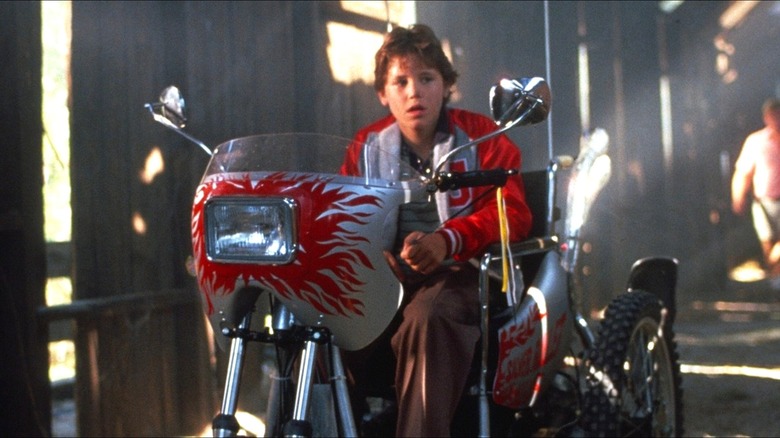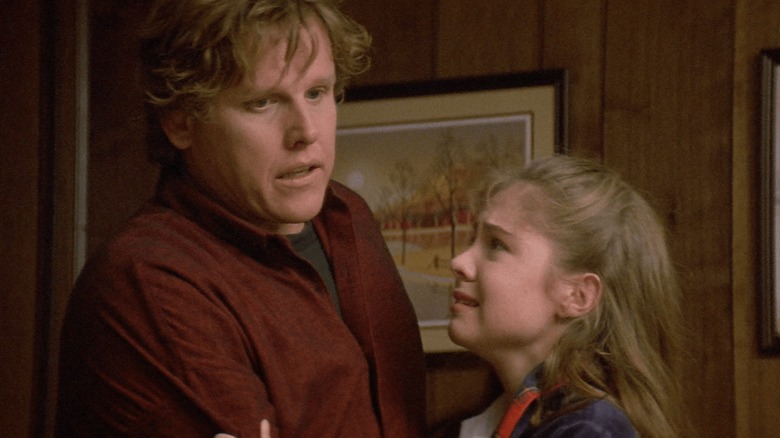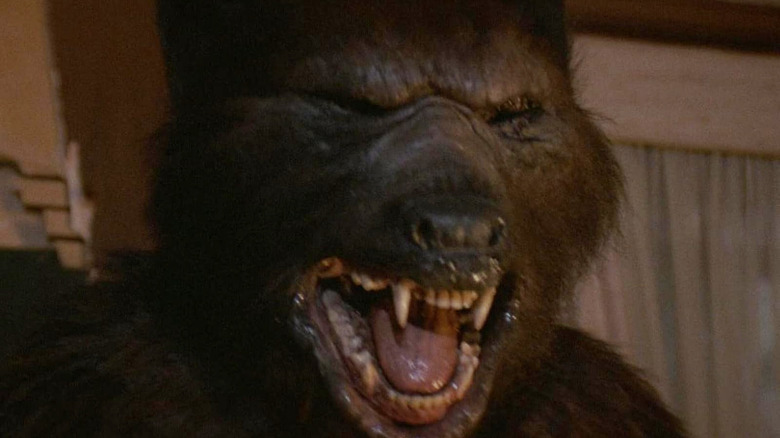A Horror Legend Quit Silver Bullet When The Producer Ignored Stephen King's Notes
We may receive a commission on purchases made from links.
Stephen King's body of literary work is astounding. While most adaptations of his literature enjoy widespread popularity (with a few evoking middling or downright unsatisfactory results), some end up flying under the radar despite being otherwise worthwhile. Dan Attias' "Silver Bullet," which is based on King's horror novella "Cycle of the Werewolf," suffered a similar fate: although generally enjoyable (it even made our rundown of the best Stephen King horror movies to watch during Halloween), this adaptation doesn't do justice to its source material at all and takes a stiff, uninspired approach to a tale about werewolf terrorizing a small town and how it affects the young protagonist, Marty Coslaw.
King was intimately involved with "Silver Bullet" once he was brought on board to supervise the first draft of the screenplay, but the film's failure to capture this conventional yet competently woven horror story doesn't solely rest on him, of course. There were changes made to the script time and again — a rather healthy and necessary aspect of any creative endeavor — but there was a severe lack of creative direction when deciding what worked best and what didn't. Most of the film's better aspects were shaped by ad-libbed lines spoken by Gary Busey's Uncle Red, which King rallied for until they made final cut, but other issues cropped up in terms of disagreements over monster design changes and narrative direction. Producer Dino de Laurentiis was often at the center of these artistic disagreements, as he did not always heed King's inputs or agree with the writers who endeavored to bring this tale to life.
In order for us to understand why the project struggled from the get-go, let us look into director Don Coscarelli's experience with "Silver Bullet," as he was initially hired to write and direct the adaptation by de Laurentiis himself, but chose to leave after witnessing something completely baffling. Coscarelli, who is best known for helming the "Phantasm" franchise (in which the first entry attained cult classic status and is a banger, for all intents and purposes), detailed this experience in his book "True Indie: Life and Death in Filmmaking," which is an immensely enjoyable read that strips the romanticism surrounding indie filmmaking and gets straight to its passionate, arduous core.
Stephen King provided invaluable notes for Silver Bullet's first draft
In his book, Coscarelli wrote in depth about his first draft of "Silver Bullet," which he crafted in collaboration with Sergio Altieri, another writer de Laurentiis hired to help shape the vision for the film. Once both writers collated their drafts and sent them to de Laurentiis for review, Coscarelli "received a disturbing call from Sergio" stating that de Laurentiis hated the script and wanted to see them soon. This is an absolute nightmare scenario for any creative, so the director was understandably apprehensive before the meeting, and he "entered Dino's office with trepidation." The way Coscarelli describes the producer's reaction to the first draft does not help matters either:
"He was grumbling and immediately launched into a 10-minute Italian and English rant about how bad our draft was. I really felt bad as he railed at us. He had spent good money to bring me out and put me up and I genuinely wanted to please the man. As I listened to him rant, something dawned on me. Dino was only criticizing Sergio's chapters and not mine. He was not aware of who wrote what."
That's a pretty tough spot to be in. While Coscarelli half-wished to put the record straight and clarify who wrote what, it would have been callous to throw Altieri completely under the bus, as the man was "extremely warm and welcoming" to him and probably did his best. Once de Laurentiis was done reprimanding them, he announced that Stephen King would be arriving to discuss the project with them the next day, and he did, proceeding to ask about the roadblocks that the team faced.
Coscarelli describes King as "a kind, warm, and gracious guy" who graciously agreed to mull over the concerns that he and Altieri were facing and offer solutions. Two days later, King responded with a fax filled with neatly written notes that were decidedly valuable for any creative involved with the project. So, what went wrong?
Don Coscarelli quit Silver Bullet for a solid reason
To have a writer, whose work you are looking to adapt, be so earnestly involved in the creative process is a blessing, especially when it is Stephen King, who knows a thing or two about writing a compelling narrative. Although Coscarelli was set to depart New York soon after and had surmised that "Dino had given up on Sergio and [him] as a writing team," he was called over once King's fax reached the producer. Excited to parse through the notes, Coscarelli noted that King sent three whole pages of notes offering solutions to every concern that was discussed prior, and to no one's surprise, "his notes were brilliant," and would have solved the rewrite issues and gotten them back on track. However, not everyone treasures the value of good feedback even if it is staring at them right in the face.
To Coscarelli's utter dismay, de Laurentiis "scowled and uttered, 'humpf'" (!) while reading King's notes and tossed them out without a second glance. This exact moment solidified Coscarelli's decision to not associate himself with "Silver Bullet" anymore, as the project was being steered by someone who didn't seem to care about the source material:
"My jaw literally dropped open. It made no sense until it did. This guy was clueless. He had just been handed a gift from the greatest writer of our generation and was happy to trash it. And he was in total control of my movie. The next day I flew back to Los Angeles and forgot about 'Silver Bullet'."
Well, that's that, and "Silver Bullet" was eventually helmed by Attias, who managed to inject some semblance of structure and meaning into the film we know and frankly, appreciate. However, Attias' views about Carlo Rambaldi's werewolf effects also clashed with De Laurentiis' during production, leading to tensions over what version of the monster would end up gracing the screen.
Either way, the werewolf is the least memorable aspect of "Silver Bullet" anyway, as the film's strength lies in a well-executed climax that sustains what little tension and terror it had built up until that juncture.


